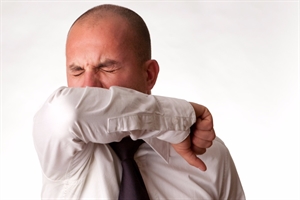Even the simplest respiratory diseases, like the common cold, can be debilitating while travelling, and you’ll certainly want to avoid dangerous illnesses like diphtheria, meningococcal meningitis, covid, measles, pertussis and TB. This goes double if you have an underlying health condition.
How are respiratory diseases spread from person to person?
Most respiratory diseases are transmitted by droplets coughed or sneezed or even exhaled by a person who is unwell. These droplets may hang in the air so other people breathe them in; or they may settle on a surface to be picked up and transferred to the eyes, nose or mouth.
Am I at risk from respiratory disease while travelling?
As you might imagine, it’s difficult to avoid the pathogens that cause respiratory disease, especially if you’re spending time in a crowded space or a shared space. Some of the settings where respiratory diseases are a particular hazard include:
- festivals, concerts and sports events
- markets
- religious services and ceremonies
- weddings and funerals
- public transport and mass transit
- healthcare settings including clinics and hospitals
- domestic settings – such as homestay accommodation, or visits to friends and family
People travelling to Africa during the dry season are at increased risk from exposure to meningococcal meningitis, as explained on our travel health advice page.
Smoky or polluted air can make some lung conditions worse, which may make you more vulnerable to the viruses that cause respiratory disease. We recommend learning about air quality at your destination if this applies to you.
You can ask about risks of exposure to respiratory diseases at your travel health appointment, and our travel health expert will help you to assess the risks and recommend some steps to mitigate them.
What can I do to avoid catching a respiratory disease while travelling?
Because it is so hard to avoid exposure to respiratory illness, it’s well worth getting vaccinated against some of the more dangerous and contagious respiratory illnesses. Check your vaccine records to see if you are fully protected from measles, diphtheria, meningitis and covid.
When you come for your travel health appointment at Canadian Travel Clinics six to eight weeks before your departure, we’ll help you to work out what catch-up shots you need before your trip abroad.
While travelling, take steps to avoid contact with people who appear unwell. Consider your choices carefully before getting into crowded situations. And wash your hands frequently to avoid transferring viruses from surfaces. If you can’t access soap and running water, alcohol handrub is good enough if your hands are not visibly dirty. Here is some advice from the Government of Canada about handwashing.
You can’t force those around you to cover their coughs and sneezes, but you can model good respiratory etiquette and hygiene yourself, and you may find it has an effect on others. Wearing a mask has become more normal since the pandemic, and good quality masks offer the wearer a degree of protection from respiratory infections.
Bring a few simple remedies to treat colds and coughs. You can speed your recovery with good self care, including rest and plenty of fluids.
Don’t let a respiratory illness ruin your trip abroad: make an appointment with Canadian Travel Clinics and you can breathe easy during your vacation!

